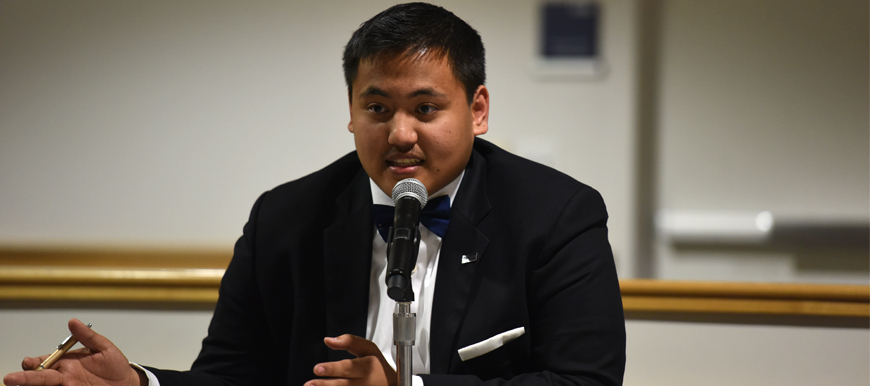Impeachment not necessary
The executive council held a vote on whether or not to recommend the impeachment of College of Humanities and Social Sciences senator Nickoles Clason on Feb. 19.
The vote did not pass with three votes for impeachment and five against. Had the council voted to impeach Clason, the recommendation would have then gone to the hearing board.
“That was a meeting of the executive council simply listening to charges to see if there was cause to be able to move it to the hearing board,” said James Morales, vice president for student services. “They didn’t find sufficient reason to move it toward the hearing board and consider impeachment.”
The reason for the vote was because Clason expressed concerns to a member of The Utah Statesman off the record, though his concerns were not published. Morales said the way he went about it compromised his duty, so student body president Doug Fiefia called a student officer meeting to hear the case.
“Senator Clason was being reviewed due to dishonesty, maintaining the integrity of his office as senator and fulfilling his duty to represent students to officers, students, administration, etc.,” Fiefia said in an email to the Statesman. “We decided to hold the meeting earlier that week. It was a USUSA Officer meeting, not an executive council meeting. It was open, and all officers were able to voice their opinions on the matter.”
Fiefia called Clason into his office to ask him to resign as CHaSS senator on Feb. 17. When Clason did not resign, he was informed of the meeting that was going to take place on Thursday.
“Earlier that day Doug had pulled me into his office to talk to me. Later that night I called Doug to let him know that I would not be resigning,” Clason said, “so he asked me to come to a special hearing of USUSA.”
Morales said the action of expressing his concerns to the wrong people, rather than what he said, was the initial issue.
“Nothing that he said was not ok. It’s about not taking this to the council,” Morales said.
Morales also pointed out that officers take an oath to follow the student code when they are sworn in. Clason did not do this, he said.
“It was simply that Senator Clason chose to go directly to the media with these items. There is no issue at all with him going to the media. Any officer can go and talk to the media. That wasn’t the problem,” Morales said. “The problem was the opportunity for those to be addressed through the formal channels of the student governance system first, as he had pledged to do.”
Morales said Clason also was not completely honest in the hearing.
“Senator Clason misrepresented the facts, and that is not acceptable either,” Morales said.
Clason said the dishonesty argument came from the USUSA meeting.
“There was some. There was one detail in the meeting that we had for the impeachment trial that did not come out right, and that is where the dishonesty comes from,” he said.
Initially, the executive council recommended punishments that Clason be placed on probation from his current position as CHaSS senator, that there be some kind of financial punishment determined by Morales and that Clason resign from candidacy for the office of USUSA Executive Vice President. However, under current USUSA constitution bylaws, the executive council does not have the power to give this recommendation.
The final consequence given by Morales to Clason was to issue a public apology.
In the current constitution, there are two ways to bring a case for impeachment or probation to the hearing board. The first is with two-thirds of the executive council voting to bring the case, and the second is 15 percent of the officer’s constituents submitting a petition. In both cases, the hearing board will then review the case and determine if impeachment is necessary.
In online voting this week, six changes to the USUSA constitution were proposed and presented as a single item for the student body to vote on. The fifth proposed change on the list was to alter that process and make it so that a two-thirds vote from the executive council could put an officer on probation without bringing the case to the hearing board. Fourth on the list was the addition of behavioral conduct to the “Good Standing” requirement for student officer eligibility.
— dahdahjm@gmail.com

